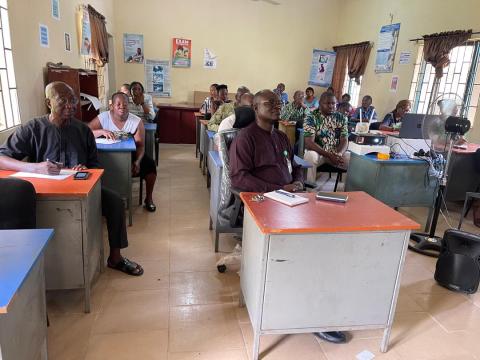About the Faculty of Science
Science serves as the foundation for any nation's progress. In light of this realisation, the Blueprint that established the National Open University of Nigeria includes Science and Technology as a cluster of Schools. When it was opened, the Faculty was known as the School of Science and Technology, and it had departments dedicated to agriculture, health, and technology.
To better accommodate the growing number of courses offered, the en School of Science and Technology separated into two additional Schools in 2013. As a result, the faculties of the Schools of Agricultural Sciences, Health Sciences, and Science and Technology became unstructured. The University transitioned to a faculty structure with distinct departments in 2016, and the School of Science and Technology became the Faculty of Sciences.
The Department of Computer Science, the Department of Environmental Sciences, the Department of Mathematics, and the Department of Pure and Applied Sciences make up the four divisions that make up the Faculty of Science. There should be no barrier to education, which is why NOUN has designed her programmes with lifelong learning in mind. The curriculum of these programmes is oriented on making it possible for as many individuals as possible to further their education in the scientific fields in order to boost national growth. So, it is with great pleasure that we welcome you to the Faculty of Sciences, our nation's foundational institution.
The Faculty of Sciences is one of the Faculties in the National Open University of Nigeria. It comprises of four departments namely:
- Computer Science
- Environmental Sciences
- Mathematics
- Pure and Applied Sciences
INFORMATION FOR NEW STUDENTS
Deferment of Admission
Is entertained only based on university policy and conditions
Change of Programme and Course
Student process change of courses via their respective study centers. The students download the required form via their Study Centers and process it through their respective Study Centers
Registered Students who wish to change their Programme of Study
Registered Students who wish to change their Programme of Study process it via their respective study centers. The students download the required form via their Study Centers and process it through their respective Study Centers.
PROGRAMME AND DEGREE AWARD REQUIREMENTS
The Programmes in the Faculty of science are designed to equip the undergraduate & postgradute students with the basic requirements for serving in a professional capacity.
Programmes
- B.Sc. Computer Science
- B.Sc. Information Technology
- B.Sc. Environmental Science and Resource Management
- B.Sc. Mathematics
- B.Sc. Maths and Computer Science
- B.Sc. Biology
- B.Sc. Chemistry
- B.Sc. Physics
- PGD. Information Technology
- M.Sc. Information Technology
- M.Sc. Chemistry (Analytical Chemistry {not currently active})
- M.Sc. Chemistry (Environmental Chemistry {not currently active})
- M.Sc. Chemistry (Organic Chemistry {not currently active})
All Programmes Duration
All courses in the Faculty of Science runs for a minimum of 4 years (8 Semesters) for 100 level entry, 3 years (6 Semesters) for 200 level entry, 2 year (4 Semesters) for 300 level entry, and 1 year and half (3 semesters) for postgraduate courses.
Prerequisite Course
To be admitted into the faculty of sciences programmes, a candidate is expected to:
UNDERGRADUAE ADMISSIONS- Have a minimum of Five credits in SSCE/GCE/NECO/NABTEB at not more than two (2) sittings obtained in the following subjects: English Language, Mathematics, Physics, Chemistry, Biology or Agricultural Sciences.
- For direct entry into 200 level of the programme, the candidate is expected to have attained a minimum of: any of the following;
a. Credit in English Language, Mathematics, Physics, Chemistry, Biology or Agricultural Sciences at the A- Level
b. Upper Credit from a recognized institution in Computer Engineering, Computer Science, Electrical Electronics Engineering, Electrical Engineering at the Ordinary National Diploma level
c. A minimum of lower credit from a recognized institution in Computer Engineering, Computer Science, Electrical Electronics Engineering, Electrical Engineering at the Higher National Diploma
- An applicant for postgraduate admission into NOUN is normally expected to have a minimum of a first degree ( second class lower) for masters or HND for PGD in a related field in addition to 5 O-Level credits including English Language and Mathematics.
- Additional requirements might apply for some programmes and these can be viewed after selecting the Programme and entry level at the Faculty's admission page.
Prerequisite For Applying
All those that wish to apply should check the admission page for detailed step to step explanation on how to apply and admission requirements here
How to Apply
- To apply for a programme, select the Faculty, choose the programme so that the View Requirement button is enable. Clicking this button will reveal the corresponding entry requirement and enable the Apply button on the pre-payment application page.
- Fill in all the remaining details on the page before submitting.
- On successful submission of the pre-payment form, you are redirected to Remita to obtain an RRR invoice which should be used to effect payment for the application form.
- An applicant who pays online using a payment card will automatically obtain the online form which must be filled before submission.
- Applicants who pay through a bank branch must click on Continue after payment... and enter their Unique ID and RRR. They are also given the opportunity to change the Programme applied for.
- Applicants who had paid using an RRR generated last semester or earlier must restart the application process upto the point when they are re-directed to remita. They should now use the newly generated UniqueID with the old RRR used for payment when they click Proceed after payment.
- In all cases a successful payment will lead to the generation of an online application form which should be filled before submission online. The admission process is automated and the outcome is virtually instantaneous!
- Please print your form and admission letter and bring them to your chosen Study Centre for verification by an Admin Officer.
Clearance/Registration Process
Student registration are done at their chosen study centres. The centre furnishes the candidate with detailed registration process.
Opening & Closing of the Course Registration portal
Students are to note that the registration portal have an open and closing date and students are required to do every necessary registration process within this time frame. The opening and closing of course registration portal is specified by the university in the published university calendar for the year.
Orientation Programme
Student orientation programme is done at their various Study Centres and online through zoom virtual meeting. Students are advised on the process accordingly
Add and/or Drop courses
Student process “and/or drop courses” through study centers. The center furnishes the candidate with details of the process.
Eligibility for Graduation
In order to qualify for graduation, the Student should have attained a Course work load which must meet the graduation requirements of the University based on minimum academic standards. However, in doing so, the student must earn a minimum of 120 credit units for the four year programme. Direct entry (200-Level) students must earn a minimum of 90 credit units, Direct entry (300 level) students must earn a minimum of 60 credits. 700 level students must earn a minimum of 60 credit units, 800 level students must earn a minimum of 35 credit units, 900 level students must earn a minimum of 70 credit units. Furthermore, the student would have passed all courses listed as core on the list of registerable courses which must include: all the GST and the new NOU courses, core Faculty and Departmental courses which includes non-examinable courses. On the whole, the minimum Cumulative Grade Point Average (CGPA) required for graduation is 1.5.
Research Projects
Individual project of approved topic related to the current research interests in the department. Students should embark on work that will lead to software development (for Computer Science & Information Technology) under the supervision of a member of staff. To be eligible for graduation, it is mandatory for every student to successfully complete a project and attain at least a credit upon final grading.
Grading, Moderation and Mode of Submission of Projects
Grading of research projects
Student project is graded by the assigned Supervisor. The grade is then approved/reviewed by the departmental academic board.
Mode of Submission of Projects
The project and the score sheet is then submitted to the Department through the Study Centre.
Degree Award Requirements
Compulsory and Elective Courses
Compulsory courses are courses which must be offered and passed before graduation. These courses are marked compulsory or ‘C’ in the list of courses to be registered each semester. They must be registered before registering any elective courses.
Elective courses are courses which a student chose from a number of optional courses in the list of courses of the semester
Electives are courses you can choose, while compulsory courses are the ones you must study to complete your degree. Electives, when added to the compulsory courses, make up the total number of units needed to complete your degree. Elective courses are usually labeled Elective of ‘E’.
CLASS OF DEGREE
The classification of degrees at the National Open University of Nigeria is determined on the basis of a learner’s cumulative grade point average (CGPA) at the end of his/her degree programe as follows:
| S/N | Degree/Certificate | CGPA Range |
|---|---|---|
| 1 | First Class | 4.50 – 5.00 |
| 2 | Second Class (Upper) | 3.50 – 4.49 |
| 3 | Second Class (Lower) | 2.40 – 3.49 |
| 4 | Third Class | 1.50 – 2.39 |
| 5 | Fail | 0.00 – 1.49 |
GOOD ACADEMIC STANDING
Good academic standing ensures student have at least a minimum of 1.5 CGPA.
END OF PROGRAMME CLEARANCE
Student process end of programme clearance through study centers. The center furnishes the candidate with details of the process.
ASSESSEMENT & EVALUATION
NOUN uses two modes of assessment for its students. These are continuous assessment and end of semester examination. The nature of the assessment is as follows;
- Tutor marked assignments (TMAs) which are basically drawn from your course materials.
- End of semester examinations including project work or practical hands-on session
In courses such as Seminar and Practical based courses such as Student Work Industrial Experience (SIWES) students do not take the TMA and examination. In the Student Work Industrial Experience (SIWES), the grading is composed of three components: evaluation by site supervision conducted by NOUN staff or NOUN appointed assessor, evaluation of learner’s technical report, and evaluation of Seminar delivered by the learner at the end of the training. In the Seminar courses, the grading is composed of three components: evaluation of learner’s term paper and evaluation of Seminar delivered by the learner.
Tutor Marked Assignments (TMA)
These assignments are provided by the tutors at any time preceeding the end of semester examination. Students are required to attempt and submit them via the TMA portal. There are usually three (3) TMAs per course and they are used for computation. Each TMA is weighed 10%. The TMA forms 30% of the overall grade of the course.
Opening and Closing of TMA portal
The TMA portal is opened to students few weeks into the semester and closed a few weeks to the end of the semester. Within this period, students are expected to attempt, complete and submit their TMA via the portal.
End-of-Semester Examinations
The end-of-semester examination constitute 70% of the finally grade earned in the course. The examination is usually pen-on-paper for 300 Level courses and above. 100 Level, 200 Level and GSTs & NOUs (courses) are usually eExamination.
The eExamination
The eExamination is usually done on the computer at the various study centers. A timetable for the courses is released to students. Students are to go to their study on the day allocated for their courses and within the timeslot allocated for the paper. The duration of each paper is determined by the credit unit of the course. Student attempt and submit the eExamination on the computers systems provided. This constitute 70% of the finally grade earned in the course.
Pen-on-Paper (PoP) Examinations
Pen-on-paper are usually for 300 Level courses and above (except the GST courses). A timetable for the courses is released to students. Students are to go to their study on the day allocated for their courses and within the timeslot allocated for the paper. The duration of each paper is determined by the credit unit of the course. Students answer the questions on their answer booklets which are retrieved at the end of the allocated time. This constitute 70% of the finally grade earned in the course.
Opening and Closing of Examination Portal
The examination is held at the various study centres. Dedicated systems are provided for the examination process from the first day allocated on the timetable to the last day on the timetable. The duration for each course/paper is determined by the credit unit of the course.
Examination Procedures
Policies
Students overall grading is based on two segments: Tutor Marked Assignment and end-ofsemester examination (except for practical based courses and seminar courses).
All end-of-semester examinations (pen-on-paper and eExamination) are administered only at the various study centres.
Student final overall grades are graded accordingly (see table below)
Scoring and Grading System in NOUN (Undergraduate)| S/N | Letter Grade | Grade Point | Description | Percentage |
|---|---|---|---|---|
| 1 | A | 5 | Excellent | 70% and above |
| 2 | B | 4 | Very Good | 60% - 69% |
| 3 | C | 3 | Good | 50% - 59% |
| 4 | D | 2 | Satisfactory | 45% - 49% |
| 5 | E | 1 | ? | 40% - 45% |
| 6 | F | 0 | Failed | 39% and below |
Scoring and Grading System in NOUN (Postgraduate)
| S/N | Letter Grade | Grade Point | Description | Percentage |
|---|---|---|---|---|
| 1 | A | 5 | Excellent | 70% and above |
| 2 | B | 4 | Very Good | 60% - 69% |
| 3 | C | 3 | Good | 50% - 59% |
| 4 | F | 0 | Failed | 49% and below |
Click the button below to access more information about the Faculty of Science.
ACADEMIC COUNTDOWN CALENDAR
Popular in NOUN
-
 About NOUN
About NOUNExCorp
-
 How to Apply
How to ApplyExCorp
-
 Programmes
ProgrammesExCorp
-
 Fee Schedule
Fee ScheduleExCorp
-
 Study Centres
Study CentresExCorp
-
 NOUN ACETEL
NOUN ACETELExCorp
-
 PG School
PG SchoolExCorp
ADVERTISEMENT
DISCOVER FASHION PARADISE AT MO-POOJA's WORLD
Elevate your style with the latest trends from our Abuja-based fashion haven for both males & females @ cheap prices!

Join Adsterra & Earn in $
Click to join

Resources
-
NOUN Past QUestions
-
NOUN Fee Checker
-
NOUN Personalized Timetable
-
NOUN TMA Archive
-
NOUN Crib
-
NOUN Examination Practice
-
NOUN CGPA Calculator
-
Purchase Project & Seminar
-
Purchase Exam Summary
-
Purchase Business Plan (GST302)
-
Useful Files
-
Course Materials
-
NOUN Plagiarism Checker
-
Generate Exam Clearance Slip
-
Generate Project Topic Slip
Quick Links
-
Frequently Asked Questions (FAQs)
-
Faculty of Agricultural Science
-
Faculty of Art
-
Faculty of Education
-
Faculty of Health Sciences
-
Faculty of Management Science
-
Faculty of Science
-
Faculty of Social Science
-
Faculty of Law
-
Business Creation & Growth (GST302)
-
After Admission into NOUN What Next?
-
Graduation Final Clearance Process














